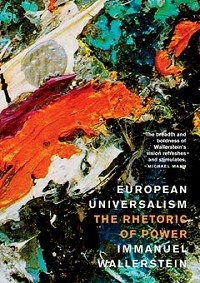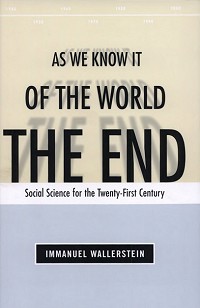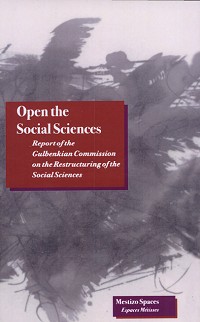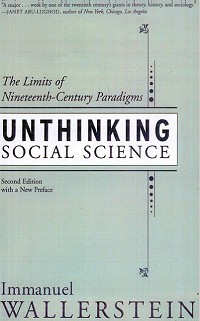
This is a revised essay about the emergence of hegemonic (US and UK) anthropology
within the professional institutionalization of
knowledge,
as created in 19th-century Europe.
Professional Knowledge Creation in the
World-System
Building an anti-imperialist anthropology—which
also involves an anthropology that studies
imperialism, and that studies itself as a
received invention of imperialism—means much
more than just analyzing and questioning how
anthropologists served this or that colonial
venture. It means totally unthinking
anthropology as a social science; more than
that, it means totally unthinking social
science. For whatever discussions of
“decolonizing anthropology” have achieved, this
ground was never covered in those discussions.
In various essays published on
Zero Anthropology, discussion was
centered on opening questions in a critique of
the relationship between anthropology and
imperialism, along with questions concerning the
terms and concepts that, initially, appeared to
be central to the debate. Here we focus on the
wider intellectual and geopolitical context of
anthropology’s institutionalization, and the
received baggage of 19th-century
European social science. In particular, I refer
to Immanuel Wallerstein for his work on the
institutionalization and formalization of the
social sciences, and how the very process of
institutionalization created the knowledge
boundaries, categories, and concepts we use
today. Not least among these received conceptual
boundaries, fundamental to the division of
knowledge into “social sciences,” is the
arbitrary construction of “society,”
“economics,” and “politics”—a division which
early political anthropologists found
problematic. Moving beyond the Eurocentrism of
the social sciences also means getting past the
false divisions in knowledge created by these
institutionalized conceptualizations.
The particular works by Immanuel Wallerstein to
which I will be referring, or that shape the
overall discussion in some way, are:

 Wallerstein,
Immanuel M. 2006.
European Universalism: The Rhetoric of
Power. New York: New Press. (Ch.
2, “Can One Be a Non-Orientalist?
Essentialist Particularism,” 31-49)
Wallerstein,
Immanuel M. 2006.
European Universalism: The Rhetoric of
Power. New York: New Press. (Ch.
2, “Can One Be a Non-Orientalist?
Essentialist Particularism,” 31-49)
Wallerstein, Immanuel M. 1999.
The End of the World As We Know It:
Social Science for the Twenty-First Century.
Minneapolis: University of Minnesota Press.
(Ch. 11, “Eurocentrism and its Avatars: The
Dilemmas of Social Science,” 168-184)
Gulbenkian Commission on the Restructuring
of the Social Sciences. 1996.

 Open
the Social Sciences: Report of the
Gulbenkian Commission on the Restructuring
of the Social Sciences.
Stanford: Stanford University Press. (Ch. 1,
“The Historical Construction of the Social
Sciences, from the Eighteenth Century to
1945,” 1-32)
Open
the Social Sciences: Report of the
Gulbenkian Commission on the Restructuring
of the Social Sciences.
Stanford: Stanford University Press. (Ch. 1,
“The Historical Construction of the Social
Sciences, from the Eighteenth Century to
1945,” 1-32)
Wallerstein, Immanuel M. 1991.
Unthinking Social Science: The Limits of
Nineteenth-Century Paradigms.
Cambridge, MA: Polity Press in association
with B. Blackwell. (Ch. 8, “A Comment on
Epistemology: What is Africa?” 127-129; Ch.
9, “Does India Exist?” 130-134)
If
anything the works above are recommended,
because we really cannot “do” or “write”
anthropology innocently any more after
reflecting on these works.
The
Institutionalization of the Social Sciences
Open the Social Sciences, the Gulbenkian
Commission led by Wallerstein, highlighted the
main historical trends that led to the
institutionalization of knowledge in
universities. “The need of the modern state for
more exact knowledge on which to base its
decisions,” they observe, led to the emergence
of new though still uncertain categories of
knowledge already in the 18th-century.
The university was until then a largely moribund
institution, at least since the 16th-century,
having been too tightly linked with the Church.
In the late 18th- and early 19th-centuries,
however, the university was largely revived as
the primary locus for the creation of knowledge
(Gulbenkian, 1996, p. 6).
The revival of the university was not actually
led primarily by natural scientists, but by
rather those who stood to lose the most from the
development of a hierarchy of a value emerging
from the split between science and philosophy
(see the “two cultures” below). Instead, it was
“historians, classicists, scholars of national
literatures…who did most to revive the
universities in the course of the nineteenth
century, using it as a mechanism to obtain state
support for their scholarly work” (Gulbenkian,
1996, p. 8). They sought the alliance of natural
scientists in promoting the new university
structures, in order to profit “from the
positive profile of the natural scientists,” and
in the process reinforcing the distinction, and
the tension, between the humanities/arts and the
sciences (Gulbenkian, 1996, p. 8).
“The intellectual history of the nineteenth
century is marked above all by this
disciplinarization and professionalization of
knowledge,” the Commission argued, pointing to
“the creation of permanent institutional
structures designed both to produce new
knowledge and to reproduce the producers of
knowledge” (Gulbenkian, 1996, p. 7).
In the wake of the French Revolution, and
especially in Great Britain and France, the
pressures for political and social
reorganization were felt strongly by the powers
that be. In place of a belief in the “natural
order” of things, many now recognized the
normalcy of change, and argued that,
“the solution lay rather in organizing and
rationalizing the social change that now
seemed to be inevitable in a world in which
the sovereignty of the “people” was fast
becoming the norm, no doubt hoping thereby
to limit its extent”. (Gulbenkian, 1996, p.
8).
“But if one were to organize and rationalize
social change,” the Commission points out, “one
had first of all to study it and understand the
rules which governed it” (Gulbenkian, 1996, p.
8). Hence the proclaimed need for a “social
science”. Social science was charged with
developing “systematic, secular knowledge about
reality that is somehow validated empirically” (Gulbenkian,
1996, p. 2). The classical premise of science at
this point was two-fold: one, the Newtonian
vision of a symmetry between past and future,
and two, Cartesian dualisms of humans and
nature, mind and matter, and so forth.
Accompanied by notions of progress, and a
finite, knowable world, the aim was to
“facilitate the explorations and exploitation
demanded by progress, and to make practical and
realizable Western aspirations to dominion” (Gulbenkian,
1996, p. 4). Exploration, exploitation, and
rapid social change, all pointed to the need to
investigate order, and for that Newtonian
physics offered the most useful support.
It was especially in the period from 1850 to
1914 when we witness a university boom occurring
in Europe, North America, and Australia, with
many new universities being founded in that very
period. That is when we also see the
disciplinarization of knowledge in the form of
the social sciences as we know them today (Gulbenkian,
1996, pp. 12-13). The five primary social
sciences were history, economics, political
science, sociology, and anthropology.
Owing to the struggle between science and
philosophy, and the social prestige of science,
the primary emphases of these “social sciences”
were the “emphasis on the existence of a real
world that is objective and knowable, the
emphasis on empirical evidence, [and] the
emphasis on the neutrality of the scholar” (Gulbenkian,
1996, p. 15).
Between 1850 and 1945, the new social science
disciplines were institutionalized: “This was
done by establishing in the principal
universities first chairs, then departments
offering courses leading to degrees in the
discipline” (Gulbenkian, 1996, p. 3). “Training”
was institutionalized as was “research”: “the
creation of journals specialized in each of the
disciplines; the construction of associations of
scholars along disciplinary lines (first
national, then international); the creation of
library collections catalogued by disciplines” (Gulbenkian,
1996, p. 3).
Of course one of the key elements in this
institutionalization was for the social sciences
to stress the differences between them, what
made them unique, and thus what required that a
special place be made for them in the new
universities. Institutionalization,
disciplinarization, expanding world capitalism,
and rapid social change thus all combined to
create and shape the social sciences as we have
known them. Each of these is tied into the
others.

“The rise of
‘social science’ did two things:
professionalization for an elite class,
and engaging it in the scientific study of
control & order”.
The Eurocentrism
of Social Science
The
rise of “social science” did two things: it
offered professionalization for an elite class,
and it engaged this elite class in the
scientific study of control and order, in a
world of rapid social change and expanding
capitalism.
Wallerstein’s core argument is that the creation
of the structures of knowledge, specifically the
institutionalization of the social sciences, is
a phenomenon that is inextricably linked to the
very formation and maturation of the capitalist
world system (or what others might loosely, and
less comprehensively, refer to as imperialism or
capitalist hegemony). There is nothing that is
either natural, logical, or accidental about the
institutionalization of the social sciences. The
structures of knowledge are accepted ways of
producing knowledge of the world. In particular,
the universalism-particularism dichotomy, and
all framings of knowledge that fit within or
between that polarity (of especial relevance to
anthropology’s intellectual mission, and central
to the revival of cosmopolitanism—see the
ZAP essay on
this), is part of the intellectual double bind
of the capitalist world system (see Wallerstein,
1991, p. 128).
In broad terms, “social science has been
Eurocentric throughout its institutional
history,” Wallerstein explains, “which means
since there have been departments teaching
social science within university systems” (1999,
p. 168). There should be no surprise here, he
adds, since social science “is a product of the
modern world-system, and Eurocentrism is
constitutive of the geoculture of the modern
world” (Wallerstein, 1999, p. 168). In
particular, “as an institutional structure,
social science originated largely in Europe (Wallerstein,
1999, p. 168).
By “Europe,” Wallerstein means primarily western
Europe and North America. One could broaden
that, using Native Studies discourse, to mean
Europe and European settler states. Even with
that more expansive definition, Wallerstein
observes that “the social science disciplines
were in fact overwhelmingly located, at least up
to 1945, in just five countries—France, Great
Britain, Germany, Italy, and the United States”
(1999, p. 168). “Even today,” he continues,
“despite the global spread of social science as
an activity, the large majority of social
scientists worldwide remain Europeans” (Wallerstein,
1999, p. 168). Penetrating deeper, Wallerstein
argues that,
“Social science emerged in response to
European problems, at a point in history
when Europe dominated the whole
world-system. It was virtually inevitable
that its choice of subject matter, its
theorizing, its methodology, and its
epistemology all reflected the constraints
of the crucible within which it was
formulated”. (Wallerstein, 1999, p. 168)
The
Eurocentrism of social science has come under
increasingly vigorous attack, especially in the
period since 1945 with the formal decolonization
of Africa, Asia, and much of the Caribbean, and
Wallerstein sees this attack as “fundamentally
justified”. Moreover he argues that, “if social
science is to make any progress in the
twenty-first century, it must overcome the
Eurocentric heritage that has distorted its
analyses and its capacity to deal with the
problems of the contemporary world” (Wallerstein,
1999, pp. 168-169). To do this, we must
understand what constitutes Eurocentrism and its
“many avatars” (Wallerstein, 1999, p. 169).
There are at least five distinct yet overlapping
ways that social science is Eurocentric, as
Wallerstein explains. The Eurocentrism of social
science is expressed in “(1) its historiography,
(2) the parochiality of its universalism, (3)
its assumptions about (Western) civilization,
(4) its Orientalism, and (5) its attempts to
impose the theory of progress” (Wallerstein,
1999, p. 169).
While “institutionalized social science started
as an activity in Europe,” Wallerstein’s
argument is about much more than this important
historical and cultural recognition. The problem
with Eurocentric social science is that it has
been “charged with painting a false picture of
social reality by misreading, grossly
exaggerating, and/or distorting the historical
role of Europe, particularly its historical role
in the modern world” (Wallerstein, 1999, p.
177). “Whatever Europe did,” Wallerstein
affirms, “has been analyzed incorrectly and
subjected to inappropriate extrapolations, which
have had dangerous consequences for both science
and the political world” (1999, p. 178).
The Received
Baggage of the 19th-Century
The
“two
cultures” division is one of the most
fundamental bases for the modern world-system’s
structures of knowledge. By the “two cultures”
Wallerstein is drawing on the work of
C.P. Snow, and referring to the
division between the sciences and the
humanities. “No other historical system has
instituted a fundamental divorce between science
and philosophy/humanities,” Wallerstein observes
(1999, p. 183). It took about three centuries
for this rupture to become triumphant in
Eurocentric thought, and to become
institutionalized. Now that this has taken
place, the “two cultures” is “fundamental to the
geoculture and forms the basis of our university
systems” (Wallerstein, 1999, p. 183).
It is this very split, between the two cultures,
that enabled “the modern world to put forward
the bizarre concept of the value-neutral
specialist, whose objective assessments of
reality could form the basis not merely of
engineering decisions (in the broadest sense of
the term) but of sociopolitical choices as well”
(Wallerstein, 1999, p. 183). Indeed, one of the
central foundations of the Eurocentric social
sciences is this very idea of “objective
science”:
“The idea that science is over here and
sociopolitical decisions are over there is
the core concept that sustains Eurocentrism,
since the only universalist propositions
that have been acceptable are those that are
Eurocentric. Any argument that reinforces
this separation of the two cultures thus
sustains Eurocentrism. If one denies the
specificity of the modern world, one has no
plausible way of arguing for the
reconstruction of knowledge structures, and
therefore no plausible way of arriving at
intelligent and substantively rational
alternatives to the existing world-system”.
(Wallerstein, 1999, p. 183)
(Personally, I doubt whether this distinction is
the core concept that sustains
Eurocentrism. It is an assertion that is
advanced without evidence, and with little in
the way of a logical explanation. The most
obvious core concept sustaining Eurocentrism is
that a progressivist history of Europe is all
that is sufficient for understanding the rest of
the world. In addition, Wallerstein’s invocation
of rationality goes against the thrust of
his apparent argument against objective
science.)
With the split between the two cultures, the
alternative to “science” was seemingly plagued
by “a lack of internal cohesiveness, which did
not help its practitioners plead their cause
with the authorities, especially given their
seeming inability to offer ‘practical’ results”
(Gulbenkian, 1996, p. 6). This story should be
very familiar to anthropologists, in their drive
to create “applied anthropology” and
anthropology in the service of military,
intelligence, and colonial administration. The
opinions of the authorities, especially those
promising funding, and demanding practical
benefits, have weighed heavily. From early on,
“it had begun to be clear that the
epistemological struggle over what was
legitimate knowledge was no longer a struggle
over who would control knowledge about nature
(the natural scientists had clearly won
exclusive rights to this domain by the
eighteenth century) but about who would control
knowledge about the human world” (Gulbenkian,
1996, p. 6).
One can sum up in this way the key dichotomies
that arose from the 19th-century
institutionalization of the social sciences,
dichotomies that are vital to sustaining the
Eurocentrism of the social sciences:
• science versus philosophy/humanities
• discontinuity-continuity
• state-centrism in analysis
• idiographic versus nomothetic
• determinism versus agency
• objectivity versus subjectivity
• politics versus economics
Anthropology’s
Baggage
The
Gulbenkian Commission devoted attention to each
of the five social sciences. What follows is
their description and analysis of the emergence,
institutionalization and disciplinarization of
anthropology specifically. At the most basic
level, the expansion of the modern world-system
involved the European encounter and usually
conquest of the peoples of the rest of the
world. In particular, those people who were
organized in social structures that Europeans
classed as small, without written records, and
not part of geographically wide-ranging
religious systems, were classed as “tribes” or
“races”. They became the domain of what would
later be called anthropology.
Anthropology had largely begun as a practice of
explorers, travelers, and officials of the
colonial services of the European powers, and
then subsequently became institutionalized as a
university discipline (Gulbenkian, 1996, pp.
20-21).
Anchored within the structures of the
university, anthropologists were constrained to
maintain the practice of ethnographic fieldwork
“within the normative premises of science” (Gulbenkian,
1996, p. 21). Some were of course attracted to
ideas of a universal natural history of
humanity, with assumed stages of development,
but their discipline was one pressed into
studying particular peoples, requiring a very
specific methodology, that of fieldwork.
Consumed with the ostensible interest in human
difference, and the particulars of non-European
modes of being, anthropologists largely adhered
to an idiographic epistemology, with some
lingering desires for developing nomothetic
propositions (Gulbenkian, 1996, p. 22).
Anthropology’s special baggage then—in the
preliminary type of analysis offered by the
Gulbenkian Commission—was idiographic research,
focused on the non-West, and in particular
focused on tribes (not the non-Western “high
civilizations” that were more the domain of the
Orientalists). As we go further, this analysis
will be deepened significantly, but it will be
useful to remember some of the broad historical
forces at work, as presented in this essay.